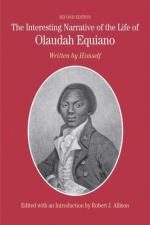a pleasant gale; and about nine o’clock that
night the moon shone bright, and the sea was smooth,
while our ship was going free by the wind, at the
rate of about four or five miles an hour. At
this time another ship was going nearly as fast as
we on the opposite point, meeting us right in the
teeth, yet none on board observed either ship until
we struck each other forcibly head and head, to the
astonishment and consternation of both crews.
She did us much damage, but I believe we did her more;
for when we passed by each other, which we did very
quickly, they called to us to bring to, and hoist
out our boat, but we had enough to do to mind ourselves;
and in about eight minutes we saw no more of her.
We refitted as well as we could the next day, and
proceeded on our voyage, and in May arrived at Philadelphia.
I was very glad to see this favourite old town once
more; and my pleasure was much increased in seeing
the worthy quakers freeing and easing the burthens
of many of my oppressed African brethren. It
rejoiced my heart when one of these friendly people
took me to see a free-school they had erected for
every denomination of black people, whose minds are
cultivated here and forwarded to virtue; and thus
they are made useful members of the community.
Does not the success of this practice say loudly to
the planters in the language of scripture—“Go
ye and do likewise?”
In October 1785 I was accompanied by some of the Africans, and presented this address of thanks to the gentlemen called Friends or Quakers, in Gracechurch-Court Lombard-Street:
Gentlemen,
By reading your book, entitled a Caution to Great Britain and her Colonies, concerning the Calamitous State of the enslaved Negroes: We the poor, oppressed, needy, and much-degraded negroes, desire to approach you with this address of thanks, with our inmost love and warmest acknowledgment; and with the deepest sense of your benevolence, unwearied labour, and kind interposition, towards breaking the yoke of slavery, and to administer a little comfort and ease to thousands and tens of thousands of very grievously afflicted, and too heavy burthened negroes.
Gentlemen, could you, by perseverance, at last be enabled, under God, to lighten in any degree the heavy burthen of the afflicted, no doubt it would, in some measure, be the possible means, under God, of saving the souls of many of the oppressors; and, if so, sure we are that the God, whose eyes are ever upon all his creatures, and always rewards every true act of virtue, and regards the prayers of the oppressed, will give to you and yours those blessings which it is not in our power to express or conceive, but which we, as a part of those captived, oppressed, and afflicted people, most earnestly wish and pray for.
These gentlemen received us very kindly, with a promise to exert themselves on behalf of the oppressed Africans, and we parted.
While in town I chanced once to be invited to a quaker’s wedding. The simple and yet expressive mode used at their solemnizations is worthy of note. The following is the true form of it:




